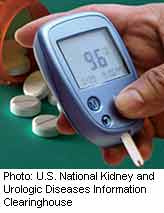- 10 Strategies to Overcome Insomnia
- Could Artificial Sweeteners Be Aging the Brain Faster?
- Techniques for Soothing Your Nervous System
- Does the Water in Your House Smell Funny? Here’s Why
- Can a Daily Dose of Apple Cider Vinegar Actually Aid Weight Loss?
- 6 Health Beverages That Can Actually Spike Your Blood Sugar
- Treatment Options for Social Anxiety Disorder
- Understanding the Connection Between Anxiety and Depression
- How Daily Prunes Can Influence Cholesterol and Inflammation
- When to Take B12 for Better Absorption and Energy
Skipping Breakfast a Bad Idea for People with Type 2 Diabetes


Running out the door without eating breakfast isn’t a good idea for anyone, but new research suggests that for people with type 2 diabetes, skipping the morning meal may wreak havoc on blood sugar levels for the rest of the day.
In a small clinical trial, researchers found that when people with diabetes skipped breakfast, their lunchtime blood sugar levels were 37 percent higher than on a day they ate breakfast. And blood sugar levels were still higher at dinnertime on the day the study volunteers skipped breakfast — 27 percent higher, the study said.
“This is of high relevance since skipping breakfast has progressively increased over the past decades in Western society,” said the study’s lead author, Dr. Daniela Jakubowicz, a professor of medicine at Tel Aviv University in Israel.
What’s more, she said, high blood sugar levels after meals are strongly associated with a rapid decline in beta-cell function. Beta cells are the cells in the pancreas that produce insulin, a hormone that’s necessary for the body to use the carbohydrates in food as fuel.
High blood sugar peaks are also linked to earlier development of heart disease complications, Jakubowicz added.
Results of the study were published recently in Diabetes Care.
Jakubowicz and her team showed earlier that eating a big breakfast and a light dinner may be beneficial. In a study published in February in Diabetologia, the researchers found that people with type 2 diabetes who ate a big breakfast and a light dinner had blood sugar levels that were 20 percent lower than people who had a small breakfast and big dinner.
In the current study, the researchers recruited 22 people with type 2 diabetes. Their average age was 57 years old. Their body mass index (BMI) was just over 28. BMI is rough estimate of how much body fat a person has, and a BMI of 28 means a person is overweight, but not obese.
Over two days, all of the participants ate the same meal at every meal — milk, tuna, bread and a chocolate breakfast bar, Jakubowicz said. On one day, they ate three meals — breakfast, lunch and dinner. On the second day, they skipped breakfast, but had lunch and dinner.
On the day they ate three meals, the average glucose peak after lunch was 192 milligrams per deciliter (mg/dL). After dinner, it was 215 mg/dL, the study revealed. But on the day of no breakfast, the average glucose peak climbed to 268 mg/dL after lunch and to 298 mg/dL after dinner, the researchers said. (A normal blood sugar level is below 126 mg/dL.)
Jakubowicz said it seems that beta cells “lose their memory” due to the prolonged fast. “Therefore, it takes additional time after lunch for the beta cells to recover, causing small and delayed insulin responses, and resulting in exaggerate elevation of blood glucose levels throughout the day on the no-breakfast day,” she said.
Maudene Nelson, a certified diabetes educator and nutritionist at Columbia University in New York City, also noted that skipping breakfast led to higher levels of glucagon secretion, which raises blood sugar levels. “Once blood sugar levels are high, it’s harder to clean up ‘the mess’ as the day goes on,” explained Nelson, who wasn’t involved with the study.
“In the past, I’ve been somewhat laid back when people tell me they skip breakfast or only have coffee, because we all have our habits,” Nelson said, adding that the findings inspire her to tell patients skipping breakfast is not OK.
Jakubowicz said protein is an important component of any breakfast. She said it aids in “intellectual concentration” and helps you feel full. Nelson said good sources of protein include eggs, yogurt, cottage cheese or beans. She said the tuna offered in the study was also a good source of protein, and she said lean ham, preferably low-sodium, could be an occasional option.
Nelson also recommended adding fruit or a whole grain to breakfast. But most cereals don’t have enough fiber to be a good choice for people with type 2 diabetes, she said.
Jakubowicz’ final advice for people with type 2 diabetes is simple: “Never skip breakfast.”
She said it’s not clear if the results would be the same in people with type 1 diabetes, and that she’s planning a trial to see the effects of skipping breakfast in people with type 1 diabetes. She also noted that for women with diabetes in pregnancy (gestational diabetes), skipping meals isn’t healthy for the baby, and could lead to excessive weight gain.
More information
To learn more about nutrition and type 2 diabetes, visit the American Diabetes Association.
Source: HealthDay
Copyright © 2026 HealthDay. All rights reserved.










